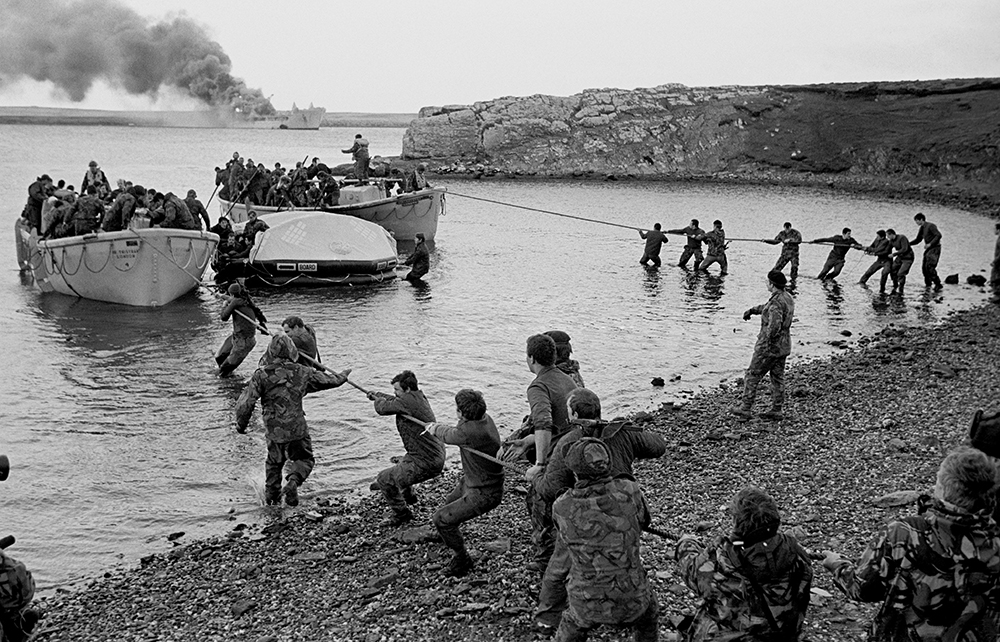The Welsh Guardsman Simon Weston is the most recognisable face of the Falklands war. He was terribly burnt when the Guards were bombed while waiting on the RFA Sir Galahad on 8 June 1982. He later became a national figure, talking openly about the difficulties of recovery, and working for burns victims and injured veterans. His portrait by Nicky Philipps hangs in the National Portrait Gallery.
It was an honour the Guardsman would have preferred to avoid. The story of the Welsh Guards in the Falklands war is that of the bombing. It was the single biggest loss of British life in one episode in the Falklands, probably in the post-1945 period. Forty-nine men were killed, 38 of them Guardsmen. Crispin Black was a second lieutenant with the Guards on the Sir Galahad that day. His book describes the terror, disbelief and peculiar calmness as cannon fire and tracer came directly towards the men on deck. Bombs dropped and the intense heat set off explosions while men struggled and helped each other to escape the fires. Black saw a sergeant, the skin of his face detached: ‘Instinctively and lost for words, I asked if he was all right. Instinctively he responded that he was fine.’ He testifies to the men’s bravery, including one Hong Kong Chinese sailor, Chiu Yu Nam, dressed in an asbestos suit, leading ten men to safety in ‘horrific circumstances’. Many survivors were haunted by that day for life.
Many of the survivors of the disaster were haunted by that day for life
Black’s aim, however, is not to remind us of the horror of bombs. He is angry that the Welsh Guards have been blamed for what happened. The familiar story is that the Guards, better suited to ceremonial duties, underprepared and freshly arrived in a combat zone, did not understand the urgency with which they should disembark their vessel and remained like ‘sitting ducks’ until the Argentines attacked. Black challenges this view, aided by documents he has found in the National Archives.
The bombing is usually referred to as the Bluff Cove disaster, but it did not happen at Bluff Cove. Rather, it took place at Port Pleasant near Fitzroy settlement, six miles from Bluff Cove on land and across a deep inlet by sea. The Welsh Guards had been split, with half the battalion and the commanding officer sent ahead to Bluff Cove. The rest of the battalion were due to join them, but difficulties in finding suitable transport delayed their journey. When they did leave, Black says, a slip in the giving of orders meant their destination was recorded as Fitzroy, which was interpreted as Fitzroy settlement, rather than Port Fitzroy, at the entrance to Bluff Cove. They were supposed to arrive and disembark in darkness, but they arrived at dawn.
The weather had been terrible for days. The commanders of the amphibious assault group, General Moore and Commodore Clapp, knew transporting troops around the coastline by sea was dangerous but assumed the poor visibility would provide some protection. On 8 June the weather changed. It was a clear day. There were supposed to be three landing craft but there was only one and it had to discharge other supplies first. When it finally returned to fetch the Welsh Guards, the ramp failed, which delayed them further. Then the air raid warning sounded and seconds later the Skyhawk pilots appeared, so low the Guardsmen on deck could see their flying helmets.

Black believes this could have been prevented. His point is that the Welsh Guards were never a priority, and he thinks Moore and Clapp favoured the Royal Marines. He argues that there should have been an army general in the chain of command, who would, he says, have better understood the importance of opening a ‘southern’ flank in the push towards Stanley. He maintains that Admiral Fieldhouse blamed the 5 Infantry Brigade’s Brigadier Tony Wilson to deflect attention from his own failure in losing half a battalion at sea.
These are bold claims. Nobody wanted this disaster. Myriad smaller decisions, each of them perhaps justifiable, or at least understandable on their own terms, came together. The result was, in one sense, avoidable; but it was also unforeseen. The commanders moved the Guards forward from San Carlos by sea because they could not go by land, and because they planned to use them in the attack on Stanley. Black has mined one seam, joining the grains to make a pattern, but the wider context perhaps contains a harder truth. The Welsh Guards were one small part of the Task Force, and nobody was able to stop it from happening. Overall, of course, Britain won.
Black shows the Welsh Guards in a new light, not just as victims of bombing but as part of the war. His book also marks a new trend, perhaps galvanised by the wars of Iraq and Afghanistan, of junior officers coming to question the hierarchies into which they were schooled and that ordered their lives in conflict. He calls it, ‘the last untold story of the Falklands war’, but, somehow, I doubt that.






Comments